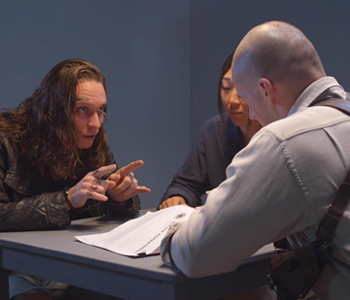Criminal Law
How To Speak With Authorities When Charged In A Federal Criminal Case
One of the most important decisions most federal criminal defendants face in their criminal law cases is the decision to cooperate with authorities. Cooperation in a federal case generally involves a two-step inquiry.
First, the government will ask a defendant’s lawyer whether the defendant is willing to give a proffer. A proffer is a meeting between the defendant, their lawyer, the prosecutor, Assistant United States Attorney prosecuting the case, and one or more of the case agents that investigated the case. The offer of proffer is made in the majority of cases and is given under the terms of an immunity agreement that is sometimes called Kastigar Immunity or Use Immunity.
Use Immunity is a limited immunity that forbids anything said during this interview from later being used against the defendant. This differs from transactional immunity, which merely prevents authorities from prosecuting the defendant for the case in question or in connection with the investigation.
Depending on the result of that proffer, the government may then reach out to the defendant or their lawyer again if it likes what the defendant disclosed. If it does, it will likely extend an offer of credit against their sentence in exchange for further cooperation via substantial assistance.
The main obligation of defendants in this situation is to tell the truth — the whole and complete truth. The government expects defendants to not just answer questions with technical truths, but to go beyond that and not withhold anything, voluntarily providing any and all information that would be reasonably related. Defendants who remember that their immunity states nothing said will be used against them at trial or at sentencing to increase their guidelines do well in their criminal law case.
The government will then take the proffer and evaluate it. If it deems the defendant told the truth but did not have much value as a witness or cooperator, it will honor its word and give the defendant the credit it said it would grant them. These credits can be things like authorization for a judge to grant a sentence that is lower than the mandatory minimum. The government may require a proffer to qualify for a rule 11 plea agreement that does not include cooperation.
On the contrary, if after the proffer the government deems the information provided by the defendant as especially valuable and decides to move forward with them as a witness or cooperator, they may ask the defendant to take the next step. This would be to go from just giving a proffer to providing substantial assistance in the investigation or prosecution of other people.
These individuals can be in the indictment that the defendant is already charged with or involved in the same investigation the defendant was involved with but just had not yet been charged or indicted with a crime. In some cases, new offenses, crimes, and investigations can be launched based on the cooperator’s substantial assistance.
If the cooperator provides substantial assistance, the government will offer a 5K motion. 5K motions are when the government goes before a judge to inform them that the defendant has provided substantial assistance in the investigation and prosecution of others, as well as recommend a break in the defendant’s sentence.
These recommendations are usually expressed in one of two ways: a percentage of time reduced off the sentence or a reduction in the offense level of the crime. Recommendations tend to range from 20 to 50 percent off the sentence duration and anywhere from two to eight, sometimes even ten offense levels off the criminal offense level. Guidelines would come down with them accordingly.
Despite this, judges are not constrained or bound by the government’s recommendation. If a court grants the 5K motion and deems a defendant worthy of a credit for their substantial assistance in the investigation or prosecution of others, the judge can exercise liberty in their determination and reward as little as they want for that substantial assistance.
With the guidance of a skilled attorney for Criminal Law Cases, you can have the peace of mind that comes with knowing that we’ll make it look easy. For more information on Criminal Law in Michigan, a free initial consultation is your next best step. Get the information and legal answers you are seeking by calling (248) 509-0056 today.
More Information
- Harnessing The Power Of Focus Groups In Criminal Defense: Strategies For Success At Trial
- Pursuing A Post-Appeal Collateral Attack On Conviction
- Ineffective Assistance Of Counsel
- Appealing The Denial Of A 6500 And 2254
- Good Cause And Prejudice In An Appeal
- Post-Appeal Collateral Attacks On Convictions
- Factual Issues In An Appeal
- Navigating Criminal Defense
- The Process Of Federal Discovery In A Criminal Case
- After Conviction: Designation, Probation, & Supervisory Release
- The Federal Grand Jury Process In A Criminal Case
- Defense And Sentencing In Federal Criminal Trials
- Federal Sentencing Mandatory Minimums
- What Happens Leading Up To A Federal Criminal Trial
- Direct Appeal Vs. Post Appeal Attacks On Conviction

Call Today For Your Free Case Strategy Session
(248) 509-0056

